Es el basal implante peligroso?
Es el basal implante viable, peligroso? A fin de responder de la manera más transparente. Aquí está un artículo sobre los estudios llevados a cabo por el Implante de la Fundación de Munich, que responde a estas preguntas. Una pregunta cuando dice que la base del implante es peligroso. Es el dentista entrenado en esta técnica o no, simplemente no quiero perder a un paciente? Sin embargo, el dominio de la tecnología y el respeto por el protocolo permite que las tasas de éxito de más del 99% a obtenerse.
Con el fin de beneficiarse de una tasa de éxito, varios factores y condiciones que deben cumplirse.
- Llame a un experimentado cirujano dentista
- Tiene una moderna infraestructura y un laboratorio certificado
- Beneficio de Ihde dental certificada de los implantes Dentales.
El Anveli experiencia de servicio ha llevado a cabo varios estudios en varios miles de pacientes que se han beneficiado de implantología basal, que hoy nos permiten tener una mirada objetiva a los verdaderos peligros y riesgos, y por lo tanto aislar las principales causas de fracaso en implantología basal.

Los estudios sobre la basal del implante
El servicio del estudio de la Internacional de Implante de la Fundación proporciona visibilidad en los resultados obtenidos por el Prof. Ihde. Por tanto, para este estudio, un total de 394 pacientes que realizaron su visita de seguimiento se han recibido un total de 4570 basal de los implantes. El estudio indica que el estado de salud de los pacientes (los fumadores, los diabéticos, hipertensión, etc.) y el tipo de los implantes colocados.
En este estudio, también llegamos de nuevo a los diferentes tipos de correcciones que fuesen necesarias. Simple malestar, el dolor, o la movilidad del implante. Este estudio resumen de como se hace referencia a varios estudios oficiales llevadas a cabo por la Internacional de Implante de la Fundación, el Prof. Scortcetti y el Dr Cooper A.
Solicitar una pericia para implantología basal
Los riesgos de la basal del implante por nuestros especialistas
El resultado del estudio sobre los riesgos de los implantes basales
Los resultados del estudio sobre 4570 basal de los implantes y de 394 pacientes seguidos proporcionar los siguientes análisis clínicos:
- El riesgo de infección de la basal del implante: 6 infecciones de tejidos blandos es decir el 0,1% (6/4570)
- Incomodidad: 25, o el 0,5%
- La pérdida de hueso: 3 o 0.1%
Correcciones debido a problemas postoperatorios
Para todos los casos estudiados, excepto en uno, la corrección podría llevarse a cabo en un solo paso por el retiro del implante y la colocación de la misma. En un caso, dos de las visitas serán necesarios para corregir el problema.
El postoperatorio problema podría ser resuelto por la eliminación de un supernumerario del implante y así evitar la remoción de la prótesis. La corrección (teniendo requiere la remoción de la basal del implante) podría llevarse a cabo durante un período de 3 días. Remover el implante podría ser reemplazados de inmediato, excepto en uno de los casos en un período de curación es necesaria para reemplazar la basal del implante.
Los resultados del estudio
La tasa global de éxito de los implantes colocados en el maxilar es de 98.9%. La tasa de éxito de la operación general después de la corrección se eleva a más del 99,8% de los pacientes estudiados. no haber querido proceder con la sustitución de un implante fue considerado un fracaso.
Nos damos cuenta de varios detalles importantes que han sido traídos a la luz por varios de los principales especialistas en implantología basal. Ningún caso de la periimplantitis ha sido observada y la tasa de fracaso es mayor en los fumadores, los diabéticos y los pacientes con hipertensión.
Entre el post-operatorio de los problemas encontrados, se nota que está en la parte protésica de que los riesgos son más altos. Así podemos encontrar los siguientes problemas:
- La decoloración de los dientes
Posibles causas: el tabaco, la falta de higiene, la saliva demasiado ácida
La corrección a realizar: pulido de los dientes - Diente roto
Posibles causas: Invisible micro crack, golpe accidental
Corrección que se hizo: Cambio de los dientes en la boca
Entre los más raros, los riesgos se encuentran:
- La retracción de las encías
Causas: un Gran número de extracciones
La corrección a realizar: la Restauración en la boca o en el cambio de la puente
El funcionamiento de la basal del implante
Otras complicaciones de la basal del implante
Muchos pacientes que han realizado su atención fuera de Anveli clínicas dentales de llamada en nuestra experiencia de servicio para resolver los problemas encontrados en su basales de los implantes. Entre las principales complicaciones encontradas, se encuentran principalmente los problemas relacionados con la prótesis fija sobre implantes basales que no sigue el protocolo (la mayoría de las veces se realiza sin certificar los laboratorios, y las complicaciones relacionadas con la colocación de una falsificación basal del implante. Estos falsificación de implantes basales están cada vez más presentes en los países del este.
Tenga en cuenta que sólo el Ihde Dental y Biomed marcas están patentados. Recuerde solicitar su certificado de conformidad después de la colocación de su basal de los implantes dentales.

